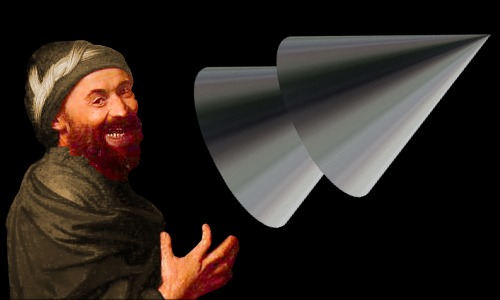Democritus-Atomic Theory of Universe-Urdu
دیموقراطیس- ایک قبل از سقراطی فلسفی جس کو بابائے طبیعات بھی کہا جاتاہے

Democritus was born into a noble family in about 460 BC in the Ancient Greek city of Abdera. After his father died, Democritus used his inheritance to travel widely, educating himself both broadly and deeply. He followed in the footsteps of earlier Greek philosophers such as Thales and Pythagoras. On eastward travels, he visited Babylon and he may have reached India. He also traveled throughout Ancient Greece before settling down again in his hometown. Democritus’ personality was calm, tenacious, and cheerful. Hence his name was laughing philosopher. He believed the main goal of life should be happy for everyone. Democritus-Atomic Theory of Universe-Urdu
Atomism
None of Democritus’ many works have survived intact. Aristotle opposed the idea of atoms, believing that matter did not exist as discrete units but was continuous. The Greek word atomos means uncuttable. The modern atomic theory began early in the 1800s with John Dalton. More than two millennia before this, Democritus’ atomic theory argued from deduction and observation rather than an experiment that:
- Atoms Made everything
- The Atoms have existed forever.
- They are indivisible – We cannot cut them into smaller particles.
- These Atoms are not alive.
- We can destroy the atoms
- These Atoms have been in motion forever and will remain in motion forever.
- Atoms pass movement between one another by collisions.
- So Atoms are infinite in number.
Soul and the Nature
Democritus seems to have used the term psychê to refer to that distinctive feature of living things. That accounts for their ability to perform their life-functions. According to Aristotle, Democritus regarded the soul as composed of one kind of atom, in particular, fire atoms. This seems to have been because of the association of life with heat. Because of spherical fire atoms are readily mobile, and the soul is regarded as causing motion. Democritus seems to have considered thought to be caused by physical movements of atoms also. This is sometimes taken as evidence that Democritus denied the survival of a personal soul after death. Although the reports are not univocal on this.
Cosmology
Democritus is also the first philosopher who realized that Milky Way is the light of distant stars. Other philosophers, including later Aristotle, argued against this. Democritus was among the first to propose that the universe contains many worlds, some of them inhabited:
Ethics
Democritus identified the good with “pleasantness” and developed a form of hedonism. Pleasantness is achieved by observing justice, controlling desires, and keeping a balance in life. While Democritus held radical materialism in the ontology. He developed a secular idealism in ethics and left a number of maxims for life.
Indivisibility and Mathematics
It is not clear, however, in what sense the atoms are said not dividable. How the need for smallest magnitudes is related to the claim that atoms are indivisible. Furley suggests that the atomists may not have distinguished between physical and theoretical indivisibility of the atoms (Furley 1967, p. 94). The physical indivisibility of the atoms seems to be independent of the argument for indivisible magnitudes. Since the solidity of atoms are the reason why they cannot be split. (the fact that there is no void within them) The existence of void space between atoms has cited as the reason why they can be separated:
one late source, Philoponus, even suggests that atoms could never actually touch, lest they fuse (DK 67A7).
Whether or not Democritus himself saw this consequence, it seems that atoms had taken as indivisible whatever their size. Presumably, though, there is the smallest size of an atom.
Anthropology
He took seriously the need to account for the origin of all aspects of the world of our experience. The explanations offered suggest that human culture developed as a response to necessity and the hardships of our environment. Thus the number of possible combinations and arrangements would occur by chance alone are important. That can show how human institutions arise without assuming teleological or theological origins (Cole 1967).
Theory of Perception
Democritus’ theory of perception depends on the claim that eidôla or images. Later atomists cite as evidence for this the gradual erosion of bodies over time. These films of atoms shrink and expand; only those that shrink sufficiently can enter the eye. It is the impact of these on our sense organs that enables us to perceive.
Note: This article was originally published on our related blog. We have merged content from our educational subdomains to provide easier access in one place. The original post is still available at: https://videos.urdutubes.com/2019/04/democritus-atomic-theory-of-universe-urdu.html
All content is owned and authored by us, and redistribution or reuse is not allowed without permission.
Note: This post is part of our content merger from multiple educational subdomains. To access the original content, visit: books.urdutubes.com for book-related content, PDFs, and downloads, or videos.urdutubes.com for video-related posts. All content is owned and authored by us, and redistribution or reuse is not allowed without permission.




![Khawateen Digest February 2025 [Download PDF] Khawateen Digest – February 2025 Edition: A Must-Read for Every Woman! The February 2025 issue of Khawateen Digest is packed with engaging stories, insightful articles, and practical tips that cater to the modern woman. From inspiring tales to expert beauty and health advice, this edition has it all. Whether you're in the mood for a gripping story or seeking helpful tips for daily life, this digest will keep you hooked. Don't miss out on the latest edition – download the Khawateen Digest February 2025 now and enjoy a well-rounded read that speaks to every woman's interests.](https://www.urdutubes.com/wp-content/uploads/2025/04/Khawateen-Digest-February-2025-Download-PDF-218x150.jpg)
![Khawateen Digest January 2025 [Download PDF] Khawateen Digest January 2025 [Download PDF]](https://www.urdutubes.com/wp-content/uploads/2025/04/Khawateen-Digest-January-2025-Download-PDF-218x150.jpeg)
![Kiran Digest April 2024 [Download PDF] Kiran Digest April 2024 [Download PDF]](https://www.urdutubes.com/wp-content/uploads/2025/04/Screenshot-2025-04-13-113317-218x150.png)
![Kiran Digest March 2024 [Download PDF]](https://www.urdutubes.com/wp-content/uploads/2018/05/KiranDigestMay2018255BDownloadFreePDF255D.jpg)








[…] oils delivered from plants during droughts and ozone made when lightning parts oxygen and nitrogen atoms. This blend does sorcery to the body when breathed […]